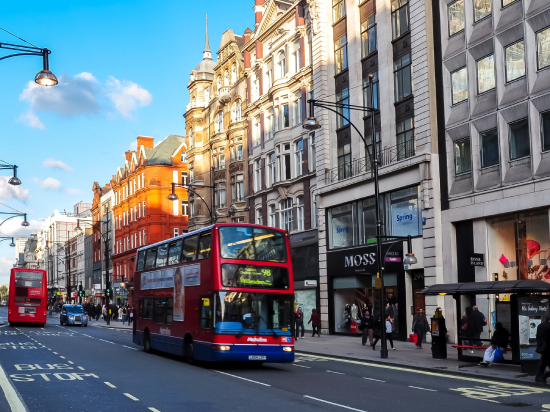Our guide here provides information on navigating the UK’s healthcare system, visa requirements and finding the right housing scheme.
Additionally, we are offering practical advice on integrating into British society, such as understanding the public transportation system and familiarizing oneself with the British educational system. Overall, a well-researched and detailed guide can greatly facilitate your relocation to the UK from a reputable international moving company like Crown Relocations.
Understanding the UK Visa Process
Understanding the Cost of Living in the UK for Expats

Housing Cost
One of the primary expenses for expats in the UK is accommodation. Rental prices vary significantly based on location. London tends to have higher rents compared to other cities and regions across the UK. On average, a one-bedroom apartment in London can cost between £1,200 to £2,000 per month, while outside the city, prices might range from £600 to £1,200 depending on the area's desirability.

Utilities
Utility costs, including electricity, gas, water, and heating, typically amount to around £100 to £150 per month for a small apartment. However, these expenses can fluctuate based on usage and the season, with higher costs during colder months.

Transportation
The UK offers an extensive public transportation network. In London, the Oyster card or contactless payment system is commonly used for buses, trains, and the underground (Tube). The monthly cost for public transport can range from £100 to £150, depending on the frequency of use and travel zones. Owning a car involves additional expenses, including insurance, road tax, fuel, and parking fees.

Food and Groceries
The cost of groceries varies based on individual preferences and dietary habits. On average, a single person might spend around £200 to £300 per month on groceries. Dining out can range from affordable options like fast food (£5-10 per meal) to upscale restaurants (£30-50+ per meal).

Miscellaneous Expenses
Additional expenses such as entertainment, clothing, internet, and mobile phone bills can vary widely based on personal choices and lifestyle. An estimate of £100 to £200 per month might cover these miscellaneous expenses for many individuals.
Finding the Right Housing
As we mentioned earlier, accommodation will be one of the biggest expenses for expats who are relocating or moving to the UK. Finding suitable housing is a crucial part of the relocation process.
Here are some things to keep in mind when searching for housing in the UK:
| Neighbourhood | The Attractions |
|---|---|
| Dulwich, London | A leafy South London neighbourhood with a mix of terrace homes, new-builds, and council estates, offering options in various price ranges. It provides a laid-back pace of life with boutiques, cafés, and delis, making it attractive for local families and young professionals. |
| Clapham, London | Known for its vibrant bars and restaurants on Clapham High Street, as well as a more relaxed atmosphere in Clapham Old Town. The area features a mix of housing options like terrace homes, new-builds, and council estates. Nearby areas like Tooting and Balham offer slightly cheaper alternatives while still being easily accessible from central London. |
| Camden, London | Situated just north of St Pancras International station, Camden is a lively neighbourhood with Camden Lock at its heart. It offers canalside bars, market stalls, artistic spaces, live music venues like Electric Ballroom and Roundhouse, and nearby parks like Primrose Hill with stunning city views. Accommodation in Camden ranges from apartments near Camden Town metro station to larger homes in exclusive areas like Primrose Hill. |
| North Greenwich, London | The Greenwich Peninsula neighbourhood is rapidly developing with modern residential high-rises along the River Thames. It features a growing number of restaurants, cafés, world-class retail outlets, and popular riverside trails. Homes in North Greenwich are predominantly apartments, making it appealing for young professionals and couples. |
| Oxford | A smaller city than London with excellent transport links to the capital. Home to the University of Oxford and known for its academic excellence, beautiful buildings, stunning scenery along the riverside, and vibrant music and comedy scenes. Oxford offers a relaxed pace of life compared to larger cities like London. |
Understanding the UK Education System
Navigating UK Healthcare Systems
Understanding the procedures and requirements for accessing healthcare services can be complex, especially if you are unfamiliar with the UK’s National Health Service (NHS).
It is important to familiarize yourself with the registration process for GP services and understand the coverage options available for expats.
Overview of the UK Healthcare System
The UK has a publicly funded healthcare system called the National Health Service (NHS). Expats may be eligible to access free NHS services but will need to pay an immigration health surcharge payment.
You can get more updated and accurate information from here.
Taxes in UK for Foreigners
Taxes for expats in the UK are based on residency status and income sources. Residents in the UK are taxed on worldwide income, while non-residents are usually taxed only on UK-sourced income.
Determining residency status involves tests like the Statutory Residence Test (SRT) or the ‘sufficient ties test.’ The UK has a progressive income tax system with rates ranging from 0% to 45%. US citizens living in the UK must file US taxes regardless of where they live or work, as the US taxes are based on citizenship.
The US-UK Tax Treaty and Totalization Agreement aim to prevent double taxation and provide guidelines for social security tax payments.
Expats can benefit from programs like the Streamlined Tax Amnesty to catch up on overdue US taxes. Seeking advice from tax professionals is recommended to navigate the complexities of expat taxes in the UK effectively
Settling into Life in the UK
Adjusting to life in the UK can be challenging for expats. Here are some tips for settling in.
Tips for Adjusting to Life in the UK
Be patient with yourself and take things one step at a time. It’s important to maintain a positive attitude and to seek help if you’re feeling overwhelmed or homesick.
Get prepared for the Brit’s weather. The weather in the UK is known for its unpredictability and can vary greatly from day to day. It’s important to check the weather forecast regularly and be prepared for sudden changes in weather conditions.
Layering clothing and a waterproof jacket and shoes can help you stay dry during frequent rain showers.
Embracing the experience and maintaining a positive attitude can help you adjust to the unique climate of the UK
Conclusion
UK relocation can be a challenging but rewarding experience.
By understanding the visa process, finding the right housing, navigating healthcare and education systems, and settling into life in the UK, expats can make the most of their move and enjoy all that the country has to offer.
In conclusion, moving to the UK involves careful planning and consideration of various factors, including the one that we have discussed above.
By understanding these key aspects, you can better prepare for their transition to the UK and make informed decisions to ensure a smooth and successful relocation.

No One Knows Better Than Us.
Get moving with our free moving quote form and let us take care of the rest!












